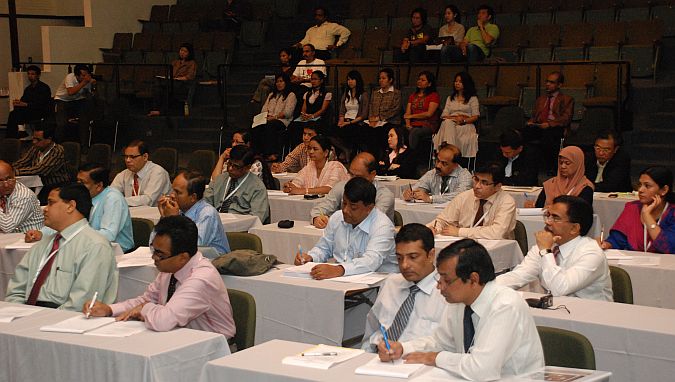Dr. Somphoch Nophakon, former Deputy Secretary General, Office of the
Civil Service Commission (OCSC), Thailand, remarked that the latest
move to shift offices from Bangkok to outskirts has facilitated access,
but it has not altered the performance levels. “Human performance
remains the same, and the key factor is not just modernization, but
human resource development,” Dr. Nophakon said. The paradigm for public
sector reform is to develop people and their capabilities, he
added.
Dr. Chaiya Yimvilai, Director for Good Governance Promotion, Thailand,
listed four factors for good governance which he termed as
“professionalization, managerialization, marketization and
internationalization.”
Dr. Suchit Bunbongkarn, President, Political Development Council,
Thailand, stressed the need to develop political institutions, and make
the political structure more effective. There is a need to instill a
sense of citizenship, and changing the constitution alone would not
solve the problem, he remarked.
Ms. Somsook Boonyabancha, Founder of Community Organizations
Development Institutes (CODI), Thailand, quoted the example of Prof.
Muhammad Yunus to stress the need for people’s involvement in community
development. “Society is moving faster than public institutions, and we
have to come up with new ways of supporting societal efforts,” she
said.
Mr. Michael E. Lowe was the moderator of the symposium, while Dr.
Willi Zimmermann, Adjunct Faculty, AIT School of Management, summarized
the proceeds of the session. Others who participated in the symposium
included Dr. Charas Suwannamala, Professor in Political Science
(Decentralization and Local Government), Chulalongkorn University; Dr.
Panthep Lapkesorn, Office of the National Education Council, Thailand;
Dr. Sandro Calvani, Director, Asian Regional Center for Millennium
Development Goals, AIT; and Dr. Pongtorn Kietdumrongwong, Quality
Consultant, Faculty of Medicine, Mahidol University, Thailand.
According to Mr. Voravate Chonlasin, Head, Public Sector Capacity
Building Unit, AIT Extension, the program is a part of the Regional
Exposure Visit (REV) under the program called “Managing at the Top 2”
(MATT2) initiated by the Department for International Development
(DFID), UK and Ministry of Public Administration, Bangladesh, for
senior civil servants from Bangladesh. Forty six senior civil service
administrators from the Bangladesh are currently at AIT for a two week
training program.

Participants at the Symposium on “Factors
for Public Sector Reform Effectiveness” organized at AIT on 17 August
2011.

